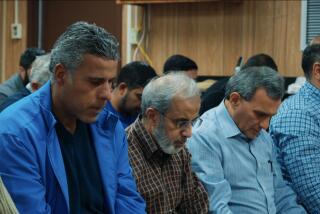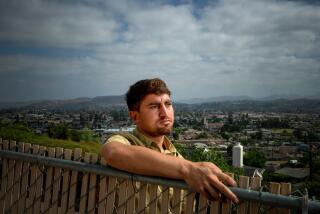U.S.-born militant who fought for Al Qaeda is in custody
- Share via
WASHINGTON AND PATCHOGUE, N.Y. — An American Muslim convert from Long Island, N.Y., who was captured while fighting for Al Qaeda in Pakistan is now cooperating with authorities, opening a rare window into the world of Western militants in the network’s hide-outs, U.S. and European anti-terrorism officials said.
Bryant Neal Vinas, 26, is one of the few Americans known to have made the trek to Al Qaeda’s secret Pakistani compounds, the officials said.
Vinas has admitted to meeting Al Qaeda chiefs and giving them information for a potential attack on New York commuter trains, conversations that resulted in a public alert in November, said the officials, who requested anonymity because the case was ongoing.
Vinas told investigators he fired rockets during a militant attack on a U.S. military base in Afghanistan, the officials said.
He was captured by Pakistanis in November and is in custody in the U.S. He pleaded guilty in January to charges including conspiracy to commit murder for firing on U.S. troops and providing material support to a terrorist organization.
An indictment was unsealed Wednesday after repeated queries about Vinas from Los Angeles Times reporters in Washington. Until then, the case had been a closely guarded secret at the heart of investigations in at least seven countries.
“It is a massive case,” said a Justice Department official.
The U.S.-born son of immigrants from Peru and Argentina, Vinas was raised a Catholic and played baseball in working-class suburbs, where Elks Lodges mixed with taquerias.
His transformation into a fighter nicknamed Bashir el Ameriki (Bashir the American) underscored fears that other Americans had followed the same route. Their ability to train overseas and return below the radar concerns authorities.
“His background is clearly unusual,” said a senior European official. “I am not aware of other Americans who went with him or who have trained recently in [Pakistan]. . . . He stands out. A Latino American is an unusual profile.”
Since his capture, Vinas has been talkative and cooperative, providing a detailed account of his sojourn and testimony for upcoming terrorism trials in Europe, the officials said.
In March, he gave a statement in New York to a magistrate and police from Belgium that will be used as evidence against three jailed Belgians who admitted to training with Al Qaeda. He also has been questioned by French investigators.
Vinas’ father says he has gone months without knowing where his son is.
“The FBI asked me all kinds of questions about him, but they don’t tell me” anything, said his father, Juan, who lives on a cul-de-sac separated by a grove of trees from an expressway in Patchogue near the south shore of Long Island.
The retired Peruvian-born engineer, 63, spoke during interviews in recent days in the home he shared with his son: a modest brick house with white siding and a statue of an angel on the lawn. Many houses in the area fly the flags of the United States and the New York Yankees.
After converting to Islam, the younger Vinas abruptly left home in September 2007, talking about wanting to study the religion and Arabic, his father said. A year later, after a truck bomb killed more than 50 people at the Marriott Hotel in Islamabad, the Pakistani capital, FBI agents interviewed the family, relatives said.
The agents told the family that Vinas was in Pakistan and asked about his travels and religious conversion, saying they were checking on Americans in Pakistan after the attack, Juan Vinas said. Since then, the FBI has not answered repeated calls and letters, he said.
“I think that the FBI knows where he is,” said the elder Vinas, a short, trim, polite man. “But they won’t tell me.”
Even during the years when Osama bin Laden’s Afghan camps trained thousands, U.S. recruits were scarce.
American converts from that era include Adam Gadahn, a fugitive propaganda chief; fellow Californian John Walker Lindh, the “American Taliban,” who pleaded guilty in 2002 to terrorism charges; and Jose Padilla, a former street gang member convicted in 2007.
After Al Qaeda lost its Afghan sanctuary, the increasingly difficult and dangerous route to the network’s new base in Pakistan dissuaded many extremists.
Vinas told investigators he arrived at the camps in December 2007, anti-terrorism officials said. Despite Al Qaeda’s fear of spies, Vinas was treated well because someone in the network’s structure had vouched for him, investigators say.
“He had a good reference, so they trusted him,” an anti-terrorism official said.
Vinas admitted to meeting front-line chiefs of Al Qaeda operations to discuss his training and potential role in the network, officials said.
In conversations between March and November 2008, Vinas gave the leaders “expert advice . . . derived from specialized knowledge of the New York transit system and Long Island Railroad, communications equipment and personnel, including himself,” according to court papers.
Soon after his capture, a federal alert was issued Nov. 25 about a “plausible but unsubstantiated” threat of an attack on a Long Island commuter train in Penn Station. It did not appear that the idea went beyond discussion stages, officials said.
Vinas underwent paramilitary training and fired rockets on U.S. troops during an attack on a military base in Afghanistan in September 2008, according to officials and the indictment.
Vinas also had contact with a group of suspected terrorists from France and Belgium, officials said. Police arrested three of the Belgians and a Frenchman after they returned to Europe late last year.
“He said that he found a lot of people in Pakistan who spoke English,” a European anti-terrorism official said. “It was clear to the others he was American. That did not seem to be a problem.”
Vinas’ combat missions made him part of a trainee elite.
His arrest took place when he visited the city of Peshawar to buy supplies and use the Internet, officials said. U.S. investigators, who monitored the Europeans’ e-mail as it was posted, may have tracked him down by intercepting communications.
In any case, his leap into the militant movement seems remarkable. Vinas grew up with his Argentine-born mother and his sister, Lina, after his parents divorced. He hung out with friends of Dominican and Puerto Rican descent, his father said.
Vinas is tall and was always clean-shaven, according to his stepmother, Rosa Gutierrez.
“He’s a good person, really,” she said. “He’s really normal.”
But Vinas could be stubborn and private, his father said. A dispute with his mother caused him to leave their house in nearby Medford and move in with his father at least four years ago, relatives say. The sister said she had not had contact with Vinas in seven years.
“I don’t know him anymore,” she said. “He’s my brother and I love him, but . . . I don’t know anything about him.”
Juan Vinas said his son resisted advice that he go to college. Vinas took technical courses and failed to complete them, his father said. He worked in nearby Smithtown but did not talk about his job, his father said.
About a year after moving to Patchogue, Vinas began spending time away from home. He told his father he attended a mosque and community center about eight miles away in Selden, the Islamic Assn. of Long Island.
The worshipers at the area’s oldest mosque, a white wooden building that used to be an Episcopalian church, are predominantly Pakistanis. The mosque president, pharmacist Nayyar Imam, said he remembered Vinas as a “very nice and always smiling, innocent” young Latino convert named Ibrahim. He said Ibrahim frequently attended the mosque for at least a year starting three years ago before disappearing.
“If I hadn’t heard the FBI charges, I wouldn’t have believed that he’s the kind of person who would do this,” he said. “He was always by himself, he never hung out with the other youngsters, who played basketball and studied or anything.”
Imam said that he talked periodically to FBI and Homeland Security officials and stayed alert for suspicious behavior.
“I keep an eye like a hawk on this place,” Imam said.
On the other hand, a former FBI counter-terrorism official said suspected extremists had been identified at the mosque.
“There could be a person in the mosque who has some radical thoughts and ideas who the imam knows nothing about,” he said.
Vinas began wearing Islamic robes and a skullcap, his father said. He immersed himself in the Koran and studying Arabic. He brought over three Pakistani friends from the mosque on one occasion. He even encouraged his father to consider converting.
“He said there were some differences between that and the Catholic [religion]. He said he [doesn’t] believe in the saints,” Juan Vinas said, pointing to a metallic relief of the Last Supper in his living room.
After his son disappeared, he said, he looked for him and asked around at the mosque, without success.
During the FBI visits last year, which he described as cordial, Juan Vinas said he showed them his son’s room. The agents took a computer, said John Sifton, a human rights lawyer retained by the family to help find Vinas. Sifton said he wanted to look into the State Department’s account that Vinas was detained by Pakistani forces, but had been released and left the country voluntarily.
When told during interviews with a reporter about allegations that his son had attended training camps, Juan Vinas slumped forward.
“I think, so many times, is he in trouble?” he said. “I don’t think he would be in trouble with, like, terrorists. I think he was in Pakistan because he was excited about the religion.”
--
josh.meyer@latimes.com
--
BEGIN TEXT OF INFOBOX
Americans linked to terrorism abroad
John Walker Lindh
Age: 28
Captured in Afghanistan in 2001, the California native was charged with conspiring to kill Americans and aiding terrorists. He pleaded guilty in 2002 to lesser offenses and is serving a 20-year sentence at a prison in Indiana.
Jose Padilla
Age: 38
Arrested in 2002 and initially accused of plotting with Al Qaeda to detonate a “dirty bomb,” he was held for years as an “enemy combatant.” Padilla, of Chicago, was convicted in 2007 of terrorism support charges. He’s now serving a 17-year sentence at the federal Supermax prison in Colorado.
Adam Gadahn
Age: 30
Born in California, he has appeared in Al Qaeda videos as a propagandist. Indicted on a charge of providing material support to terrorists, he’s been sought since 2004 by the FBI, which offered a $1-million reward for his capture.
Source: Times research
More to Read
Sign up for Essential California
The most important California stories and recommendations in your inbox every morning.
You may occasionally receive promotional content from the Los Angeles Times.












